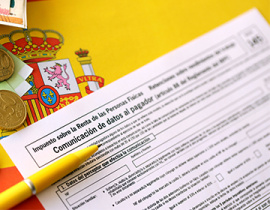- Home
- Blog
- Tips & Advice
- Comprehensive Guide to Starting a Business in Spain
Comprehensive Guide to Starting a Business in Spain
.jpg) Spain is a country known for its rich culture, beautiful landscapes, and a thriving economy. It is also a growing hub for entrepreneurs looking to start a business in Europe. Starting a Spanish company can be a smart move for entrepreneurs who are already living in Spain or planning to relocate. The country offers a supportive business environment with growing opportunities in tourism, tech, and sustainable energy. Before launching your venture, it’s essential to explore local business ideas that align with market demand. Whether you're considering starting a business in Spain as a foreigner or are just curious about how to start a business in Spain, this guide will walk you through the essential steps, costs, and legal requirements for opening a business in Spain.
Spain is a country known for its rich culture, beautiful landscapes, and a thriving economy. It is also a growing hub for entrepreneurs looking to start a business in Europe. Starting a Spanish company can be a smart move for entrepreneurs who are already living in Spain or planning to relocate. The country offers a supportive business environment with growing opportunities in tourism, tech, and sustainable energy. Before launching your venture, it’s essential to explore local business ideas that align with market demand. Whether you're considering starting a business in Spain as a foreigner or are just curious about how to start a business in Spain, this guide will walk you through the essential steps, costs, and legal requirements for opening a business in Spain.
Why Start a Business in Spain?
Before diving into the process, it’s important to understand why Spain could be an excellent choice for setting up your business. Spain offers a vibrant economy, a strategic location within the European Union, and a relatively low cost of living compared to other EU countries. With a booming tourism industry, a rich agricultural sector, and a growing demand for tech startups, Spain offers a diverse range of business opportunities.
But the real question is: Is Spain a good place to start a business? Absolutely! Spain is a welcoming environment for entrepreneurs, with a government that offers various incentives for small and medium enterprises (SMEs). The country’s robust infrastructure, access to a highly skilled labor force, and quality of life also make it an attractive location for business owners.
Can a Foreigner Start a Business in Spain?
The answer is yes! Spain is open to foreign investment, and there are no restrictions that prevent non-Spanish residents from starting a business. In fact, the Spanish government has made it easier for foreigners to enter the market by simplifying the business registration process and offering various incentives to foreign investors.
The Process of Starting a Business in Spain
Buying business for sale in Spain involves several steps, and it's essential to familiarize yourself with the entire process to avoid costly mistakes. Here’s a step-by-step breakdown of how to set up a business in Spain.
Step 1: Choose Your Business Structure
One of the first decisions you’ll need to make is the type of business structure you want to establish. There are several types of companies in Spain, including:
- Sole Proprietorship (Autónomo): Ideal for freelancers or small businesses.
- Limited Liability Company (SL, S.L.): Common for small to medium-sized businesses.
- Public Limited Company (S.A.): Suitable for larger businesses with significant capital.
Each commercial investment type has different implications regarding taxes, liability, and management. Therefore, it’s crucial to choose the right one based on your business goals. Setting up a company in Spain as a foreigner often leads to choosing the S.L. structure due to its flexibility and lower cost. To explore commercial real estate in Spain you can check the listings now.
Step 2: Register Your Business in Spain
.jpg) Once you've chosen your business structure, the next step is to register a business in Spain. This involves several key actions:
Once you've chosen your business structure, the next step is to register a business in Spain. This involves several key actions:
- Obtain an NIE Number: Foreigners need a Foreign Identification Number (NIE), which is required for all business activities in Spain.
- Register with the Spanish Tax Authorities: You’ll need to register for a tax ID (CIF or NIF) to ensure that your business complies with Spanish tax laws.
- Opening a Bank Account: To complete the process, you’ll need to open a business bank account in Spain.
- Business Registration Number Spain: You'll receive a business registration number from the Spanish Commercial Registry, which will make your business officially recognized.
Step 3: Set Up the Legal Framework
The next phase of setting up a business in Spain involves drafting essential legal documents, including the company’s bylaws, shareholder agreements, and contracts. It's advisable to consult a local lawyer to ensure compliance with Spanish business law.
Additionally, registering a business in Spain also means meeting labor regulations, such as registering employees with the Social Security system and understanding the rules surrounding contracts and wages.
Step 4: Apply for Relevant Permits and Licenses
Depending on the type of business you are starting, you may need to apply for specific business licenses in Spain. For example, restaurants, bars, or retail shops will require health and safety permits, while a tech startup may need other types of licenses. The requirements vary depending on the region of Spain you are operating in, so it’s essential to check with the authorities.
Cost of Starting a Business in Spain
One of the main concerns for any entrepreneur is the cost of starting a business in Spain. The costs can vary significantly based on the type of business you want to set up and the region in which you plan to operate. However, here’s a rough breakdown of the most common expenses:
- Registration fees: These can range from €300 to €1,000, depending on the complexity of your business structure.
- Legal and Notary Fees: Legal fees for drafting your company’s statutes and contracts can cost between €500 and €2,000.
- Business Bank Account: There might be initial deposits required, generally between €100 and €1,000.
- Licenses and Permits: The costs vary by industry and location but could range from €200 to €2,000.
- Social Security Contributions: These are mandatory if you have employees and can amount to several hundred euros monthly.
Overall, the cost of starting a business in Spain is relatively reasonable compared to other European countries, making it a viable option for many entrepreneurs.
Advantages and Disadvantages of Starting a Business in Spain
Like any country, starting a business in Spain comes with its own set of advantages and disadvantages. Let’s explore some of these.
Pros:
- Access to EU Market: Spain’s membership in the European Union offers businesses access to a vast market with over 500 million consumers.
- Affordable Labor: Spain offers competitive labor costs, which is attractive for entrepreneurs looking to employ skilled workers.
- Government Support: The Spanish government offers various incentives and grants for new businesses, especially for technology startups.
Cons:
- Bureaucracy: While the process has become easier, the bureaucracy in Spain can still be challenging for foreigners, particularly in terms of paperwork and permits.
- High Taxes: Business owners in Spain face relatively high corporate tax rates compared to other European countries, which can be a drawback for new businesses.
- Language Barrier: Although many Spaniards speak English, dealing with the local bureaucracy and legal processes may require proficiency in Spanish.
Common Challenges for Foreigners Starting a Business in Spain
.jpg) Foreigners often face specific challenges when starting a business in Spain. These can include:
Foreigners often face specific challenges when starting a business in Spain. These can include:
- Navigating the Legal System: Spanish legal and tax regulations can be complex, especially for those who are unfamiliar with the system.
- Understanding Local Business Culture: The business culture in Spain can be quite different from what foreign entrepreneurs are used to. Networking, building personal relationships, and adhering to local business etiquette are crucial for success.
- Getting Funding: While Spain offers various funding options, foreigners may face challenges when seeking financial support from local banks.
Buying commercial property in Spain is a rewarding venture for foreigners. With its robust economy, strategic location, and welcoming government policies, Spain remains one of the best places in Europe to launch a business. However, it’s essential to be aware of the legal requirements, costs, and potential challenges involved. By following the proper steps, choosing the right structure, and understanding the business protocol in Spain, you can set up a successful enterprise in this thriving country.
Whether you're looking to open a business in Spain as a foreigner or simply want to explore your options, this guide offers a comprehensive overview of the key factors to consider!








